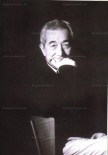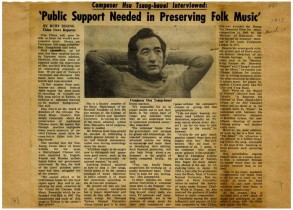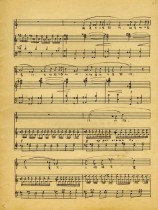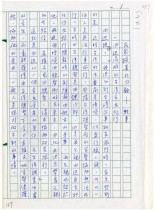|
I. Introduction of Professor Hsu Tsang-Houei
Professor Hsu Tsang-Houei, born in Changhua, Taiwan in 1929, is a leading figure among Taiwanese composers. Hsu graduated from the Department of Music at National Taiwan Normal University and then went to Paris in 1954 to study composition with André Jolivet. His music was influenced by Claude Debussy, Béla Bartók and Chinese composer Kwang-Chi Wang. In 1959 Hsu returned to Taiwan and introduced the liberal thinking and twentieth-century composition techniques to Taiwan. He taught at several music departments and introduced avant-garde ideas to the country. He also co-founded several associations to promote contemporary music: the Chinese Composers’ Forum (1961), the Waves Group (1963), the Five (1965), the Chinese Society for Contemporary Music (1969) and the Asian Composers’ League (1971). In 2001, at the age of seventy-two, Hsu passed away in Taipei.
II. Folklore Music Collection
During the time that Professor Hsu studied in Paris, he started to contemplate making music which would truly represent Taiwan. After he came back to Taiwan, he began to search for music material. Hsu and Professor Shi Wei-Liang initiated the “Folk Song Collecting Movement” in 1966-1967. The movement marked the very first large-scale effort in which people in Taiwan looked deep into local communities to collect the folk songs that were about to perish. During the movement, researchers collected approximately 2,000 traditional Taiwanese music pieces, including works by indigenous tribes and the Han people.
Originally recorded on 122 cassette tapes, the aboriginal music and folklore was eventually digitized in 2007 and recorded onto HDDs and DVDs. The recordings were made on tribes Amis, Paiwan, Atayal, Bunun, Rukai, Puyuma, Tsou, Yami, Thao, Karalan, Truku and Saisiyat. Already digitized from cassettes are Amis’ monophony music such as antiphonal rite music, dance music and folklores as well as music in their special polyphony singing style. Digitized also are Atayal’s vocal and instrumental music.
Professor Hsu collected Han Chinese music from 1960 to 1970. The traditional Han Chinese music in Taiwan is performed mainly by Holo (Fulao) and Hakka people, descendants of migrants from south-east China. Nowadays the traditional music can be heard primarily in the western plain of the central mountains and in some hilly areas. (1) The animated beiguan music, played in religious celebrations and Daoist rituals, mainly uses the instruments of guchui (shawms, drums and other percussion) and sizhu (bamboo wind, plucked strings and bowed strings). (2) The nanguan music is mainly a vocal repertory accompanied by instruments such as nanhu, pipa, zither, hsiao and flute which create soft melody and gentle rhythm in general. (3) Hakka singing is referred to as “Nine Accents and Eighteen Melodies” because of the great variety of their songs. The 3-role tea-picking opera is a famous traditional music genre.
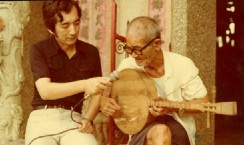
|
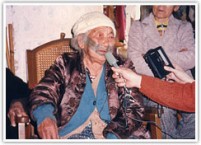 |

|
| Hsu recording Chen Da’s Pin-pu tribe folk song |
Hsu (holding microphone) recording Atayal music |
Hsu recording Han Chinese music (Nanguan) |
III. Music notes, hand scripts and news articles
There are over 10,000 pages of music notes and personal writings by Professor Hsu and news articles about him. These materials were digitized in 2009-2010.
The hand-written music notes include Four Poems by Pai Chiu (work No.4, 1958-9), Three Tunes for Homesickness (work No.7, 1959), The Song of Burying Flowers (work No.13, 1962) and NÜ-GUAN-ZI (work No.14, 1963). Hsu’s personal writings include articles and conference papers on ethnomusicology, modern composition, musical form analysis, and organizations such as Asian Composers’ League. The press clippings of related stories are from 1959 to 2001. They show the progress of Taiwan modern music composition and social changes.
Text and images are provided by The Digital Information Value-added Program of Professor Hsu Tsang-houei’s Folklore Music Collection and Graduate Institute of Ethnomusicology, National Taiwan Normal University, Taiwan
|








